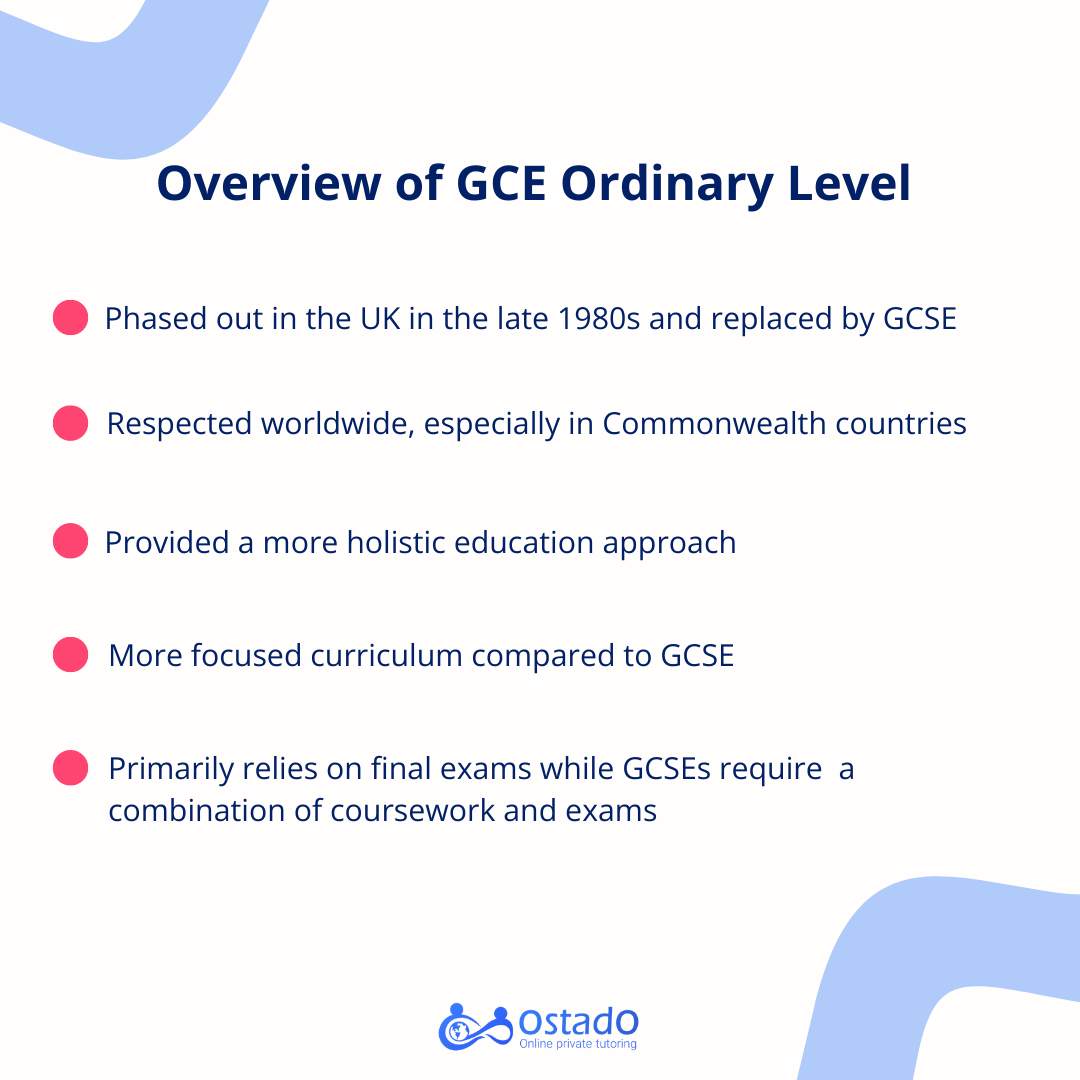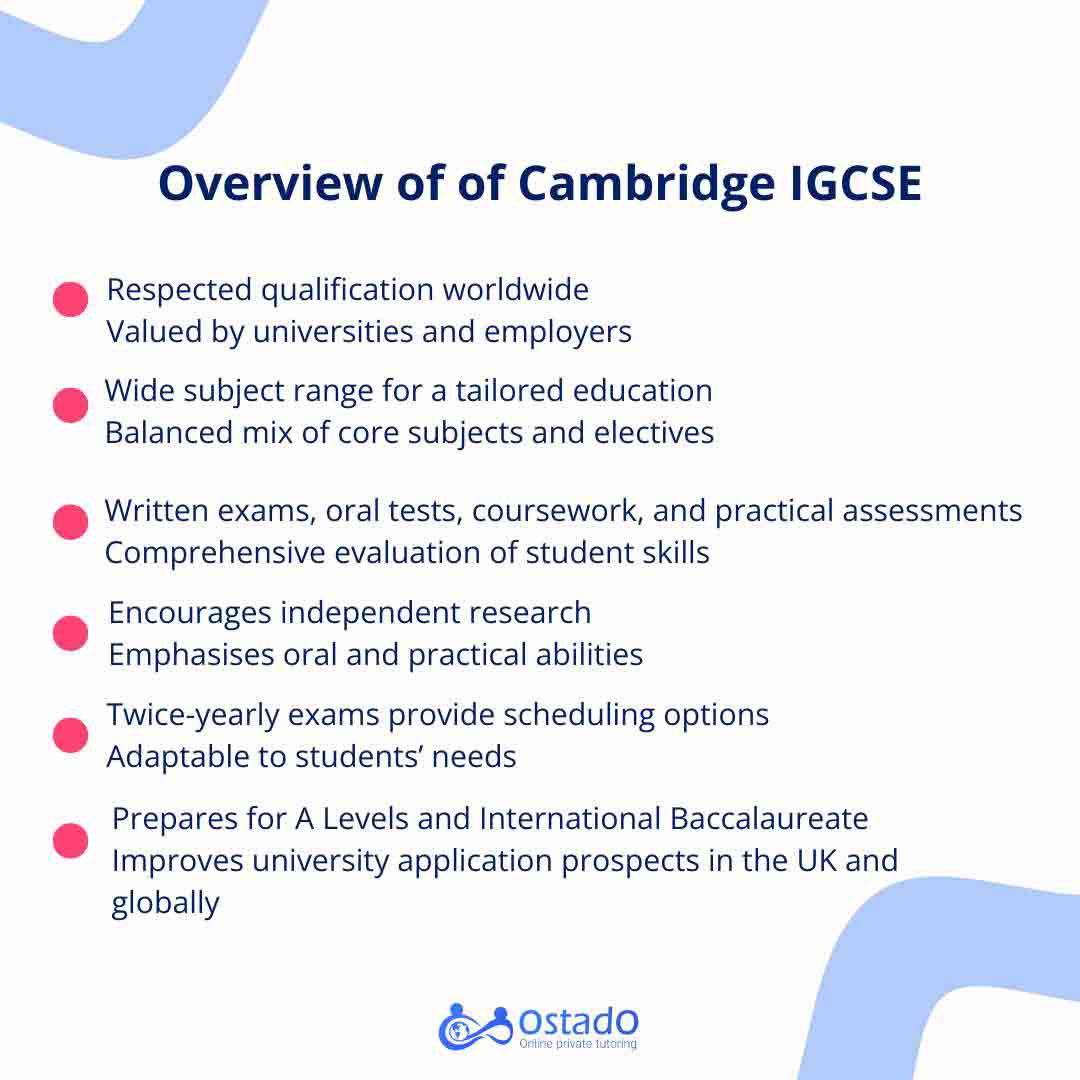Are GCSEs the same as O Levels? No, they’re different. GCSEs replaced O-levels in 1988. What are the main differences?
Many people aiming for higher education or employment in the UK ask about is GCSE O level? What are IGCSEs? How to choose the best qualifications to achieve your goals? Let’s find out.
A Brief Overview of GCE Ordinary Level
GCE Ordinary Level, commonly known as O-level, stands for General Certificate of Education Ordinary Level. The certification was introduced in the 1950s.
It was a subject-based qualification that secondary school students in the UK and various Commonwealth countries took after completing secondary education, around the age of 16.
What are the Main Aspects of the GCE Ordinary Level?
O-levels were recognised and respected worldwide, especially in Commonwealth countries. High O-level grades were often required for university admissions and advanced-level courses (A-levels) or equivalent qualifications.
Why Did They Shift to GCSEs?
GCSEs contain more coursework with a practical and balanced curriculum. This shift was aimed at modernising the education system. It also made it possible for students to explore more interests.
How to Choose?
Besides GCSEs, there are alternative qualifications accepted by universities and employers.
If you are wondering whether GCSEs work for you, OStado is here to help. Our highly qualified GCSE tutors help students around the UK get the best results.
You will receive personalised attention, constant feedback and a free trial.

GCSE vs. O Level: A Detailed Comparison
Although GCSEs and O Levels serve similar purposes, their structure and approach vary. Let’s take a look:
Curriculum Differences
GCSEs offer a broad and balanced curriculum. They cover various subjects, including core subjects like Maths, English, and Science, as well as elective subjects like Art, Music, and Technology. The curriculum aims to provide a well-rounded education that develops multiple skills, such as oral and practical skills.
O-levels, on the other hand, had a more focused curriculum. They concentrated heavily on traditional academic subjects and often did not include as many practical or vocational subjects as the GCSEs do today. The emphasis was more on theoretical knowledge. Many O-level qualifications were overseen by Cambridge International Examinations.
Assessment Methods
GCSEs use a combination of coursework and exams. Coursework can include practical work, projects, and assignments completed over the course of the study. Exams are usually taken at the end of the course, and they test a wide range of skills and knowledge.
O-levels primarily relied on final exams. The O-level examinations were comprehensive and covered the entirety of the course material. The assessment was heavily based on a student’s performance in these final exams, with little to no coursework involved. Some subjects, particularly those under Cambridge O-level, included practical components, but these were less common.
Grading Systems
GCSEs use a grading system that ranges from 9 to 1, with 9 being the highest grade.
O-levels used a different grading scale, typically ranging from A to E, with A being the highest grade. This grading system was more straightforward but provided less granularity in distinguishing student performance at the higher end.
Similarities Between the Two
Despite their differences, GCSEs and O-levels share some similarities. Both are secondary school qualifications that assess a student’s knowledge and skills in various subjects. They both aim to prepare students for further education or entry into the workforce. GCSE Tutors in Ostado can help you excel in both, providing tailored tutoring to meet your specific needs.
Both qualifications require a strong understanding of the subject material and the ability to apply knowledge. They also serve as milestones in a student’s educational journey, marking the transition from secondary education to higher education or vocational training.
| Global Recognition and Acceptance of GCSEs and O Levels | ||
| Aspect | GCSE | O Level |
| Recognition | Widely recognised globally | Widely recognised globally |
| Countries | UK, Australia, Canada, Singapore, Malaysia | UK, Commonwealth countries |
| Key Countries | Standardised measures, strong foundation | Standardised measured, strong foundation |
| Student Mobility | High | High |
| Further Education Opportunities | Broad access to global universities | Broad access to global universities |
What is Cambridge IGCSE?
Cambridge IGCSE is an internationally recognized qualification from Cambridge Assessment International Education. It is equivalent to GCSE and highly valued by universities and employers worldwide.
The curriculum offers a wide range of subjects, allowing students to tailor their education to their interests. It includes core subjects like Maths, English, and Sciences, as well as languages, arts, and humanities.
Assessment methods are diverse, including written exams, oral tests, coursework, and practical assessments. This ensures a comprehensive evaluation of students’ knowledge and skills.
Cambridge IGCSE develops critical thinking, problem-solving, and independent research skills. It also emphasises oral and practical skills.
Exams are held twice a year, providing flexibility. Cambridge IGCSE prepares students for further studies like A Levels and the International Baccalaureate. High grades can enhance university applications, both in the UK and internationally.

How GCSE and O Level Affect University Admissions
GCSE and O-level qualifications are important for university admissions. Universities in the UK and many other countries use these grades to assess a student’s potential for higher education. High grades in GCSEs or O-levels enhance a student’s application, often being a key factor in gaining admission to competitive courses and institutions. They demonstrate a strong academic foundation and the ability to perform well in standardised exams.
Influence on Career Opportunities
Holding GCSE or O-level certificates can open up numerous career opportunities. Employers often look for these qualifications as a minimum requirement for entry-level positions. They are seen as evidence of basic educational achievement and developing important skills such as critical thinking, problem-solving, and communication. High grades can further enhance job prospects, indicating a candidate’s dedication and capability.
Mastering Your GCSE and O Level Exams: Top Tips for Success
Nailing your GCSE and O Level exams is all about smart revision and taking advantage of personalised lessons. Consistent and structured revision boosts your understanding and helps you retain key concepts. Personalised lessons are a game-changer, allowing you to focus on your strengths and tackle areas that need improvement.
With the right approach, you’ll be on the fast track to exam success! That’s where Ostado GCSE tutors come in, helping you achieve the best results. Check out our top tips below:
Study Strategies and Revision Techniques
-
- Create a study schedule: Plan your study time well in advance. Break down your subjects into manageable chunks and allocate specific times for each topic.
- Active learning: Engage with the material actively by summarising notes, creating mind maps, and teaching concepts to someone else.
- Use flashcards: Create flashcards for key terms, formulas, and concepts. Regularly review them to reinforce your memory.
- Use exam board past papers. They help you understand the exam format and study accordingly.
- Review the mark schemes. By doing so, you’ll know what examiners look for.
Time Management Tips
- Set priorities: Focus on the subjects and topics that you find most challenging first.
- Avoid procrastination: Break tasks into smaller steps to make them less daunting and start working on them immediately.
- Use a Timer: Implement the Pomodoro technique (25 minutes of focused study followed by a 5-minute break) to maintain concentration and avoid burnout.
- Balance: Ensure you allocate time for rest, exercise, and leisure activities to keep your mind fresh and reduce stress.
Resources and Tools for Effective Preparation
- Textbooks and Revision Guides: Use recommended textbooks and revision guides tailored to your syllabus.
- Online Resources: GCSE revision apps and Websites and educational YouTube channels offer valuable tutorials and explanations.
- Apps and Tools: Use apps like Quizlet for flashcards and online planners for scheduling.
Is GCSE O level FAQ
- Is O level equivalent to GCSE?No, they are not equivalent, but they serve similar purposes. O-levels were the predecessors of GCSEs and were phased out in the UK in the late 1980s. GCSEs have a broader curriculum and include more coursework.
- What is the O level in the UK?O-level (Ordinary Level) was a subject-based qualification that secondary school students took, typically at the age of 16. O-levels were part of the General Certificate of Education (GCE) system. They were replaced by GCSEs (General Certificate of Secondary Education) in the late 1980s.
- Is O level harder than GCSE?O-levels were more focused on final exams and theoretical knowledge, which some may find more challenging. GCSEs, however, include a mix of coursework and exams, aiming to provide a more balanced and practical approach to assessment.

